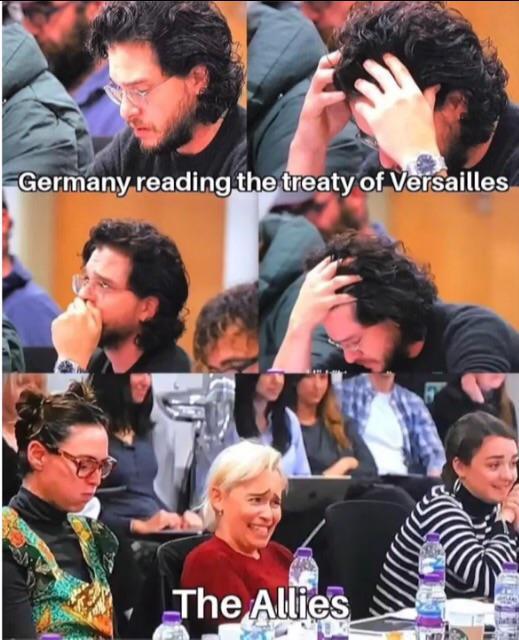#the treaty of versailles
Text
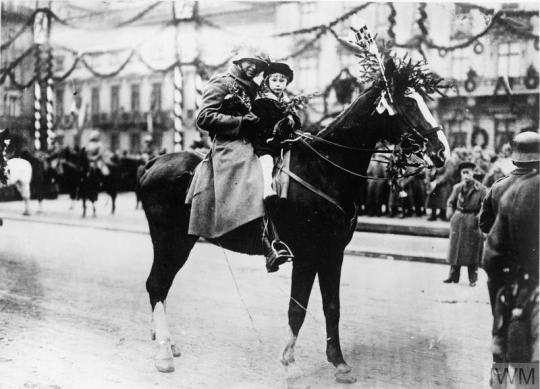
Okay so I left this a bit late but because I'm in NZ i didn't want to be wildly early and then procrastinated a bit, some of you who I know from TTrpg will have seen this image already but it is my favourite homecoming photo from the end of the war, a father and son celebrating as they ride together through their town, decorated for Christmas.
I imagine many other blogs similar to mine will have made posts lamenting the dead today, and while I share their respect for those who passed, I will be doing something slightly different.
I think that it is just as important to remember those that lived, those who returned to shattered countries, to families ruined by famine and disease, those who left a piece of themselves at the front, figuratively and literally.
Heres to honouring those that came home changed forever, those that never had a good night's sleep again, those that buried their friends at Verdun, the Somme, Passchendaele, Gallipoli, Caporetto, Galicia and Tannenburg.
Those who returned to countries that treated them as second class citizens, those who returned home to find the war still going in their little slice of the world, the ones who were lied to, the last ones left and the ones who wished they'd never come home at all.
We need not forget the ones who survived hell and were left to endure its memory to the end of their days.
I love you all, and though we'll never meet, you have my heart forever and always.
#edwardian#ww1#first world war#1910s#remembrance day#armistice day#November 11th#treaty of versailles#the great war
55 notes
·
View notes
Text

Goebbels s'exprime contre le résultat de la conférence de Lausanne sur les réparations de guerre lors d'une réunion de protestation du parti national-socialiste – Lustgarten – Berlin – Juillet 1932
©Bundesarchiv - Bild 119-2406-01
#avant-guerre#pre-war#conférence de Lausanne#Lausanne Conference#traité de Versailles#treaty of Versailles#joseph goebbels#goebbels#lustgarten#berlin#allemagne#germany#07/1932#1932
49 notes
·
View notes
Text
Aus solchem aufgezwungenen Frieden müßte neuer Haß zwischen den Völkern und im Verlauf der Geschichte neues Morden erwachsen.
From such an enforced peace new hatred between the peoples and in the course of history new murders should grow.
Friedrich Ebert (1871 – 1925), German politician and first president of the Weimar Republic commenting on the treaty of Versailles
9 notes
·
View notes
Text
uwaug i wanna do history roleplay with a bunch of friends so bad
#‘oh slutcore surely you mean historical roleplay’ - no#i wanna renegotiate the treaty of versailles with you#and then worldbuild the absolute shitstorm that would follow
2 notes
·
View notes
Text
GOODMORNING 🫡🫡
#I'M GIVING TODAY'S HISTORY CLASS ABT THE. THE TREATY OF VERSAILLES. YEAH#WISH ME LUCK ‼️‼️‼️‼️‼️‼️‼️‼️
8 notes
·
View notes
Text

Ruth Polling, 11 November 2020
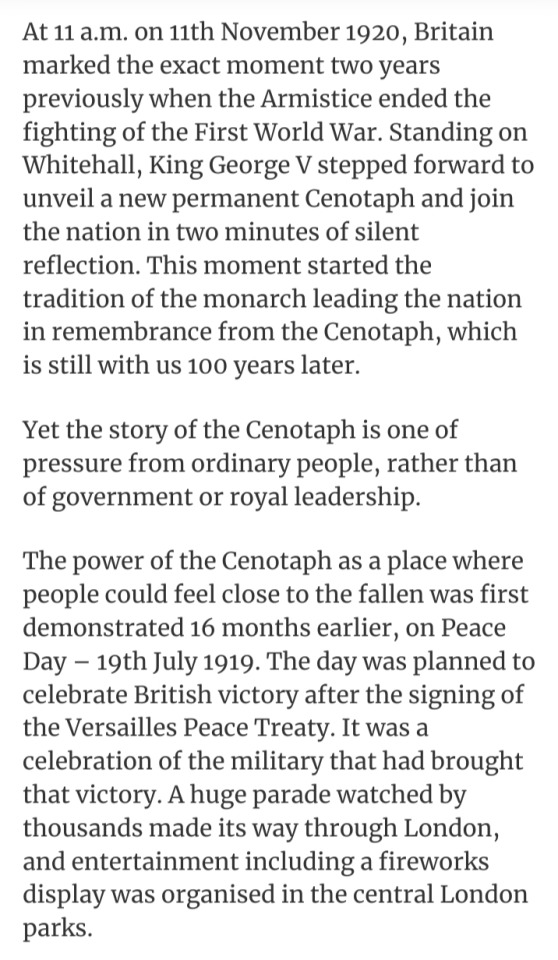
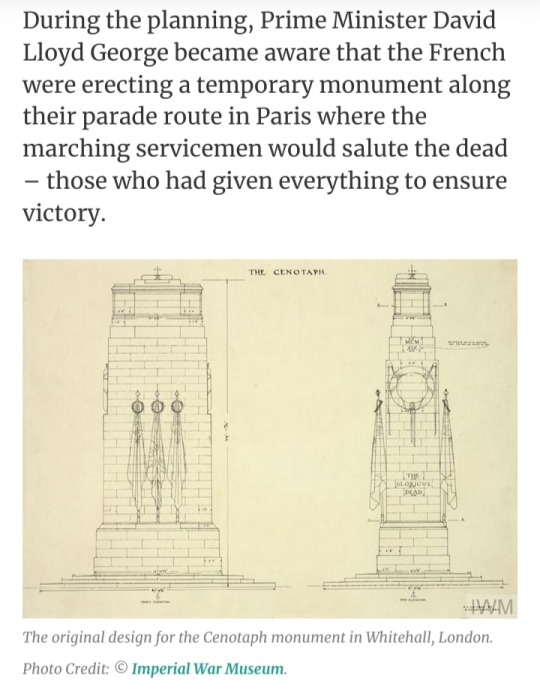

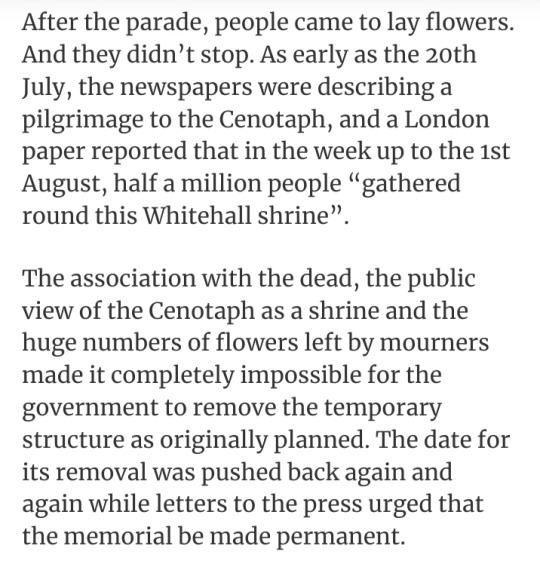
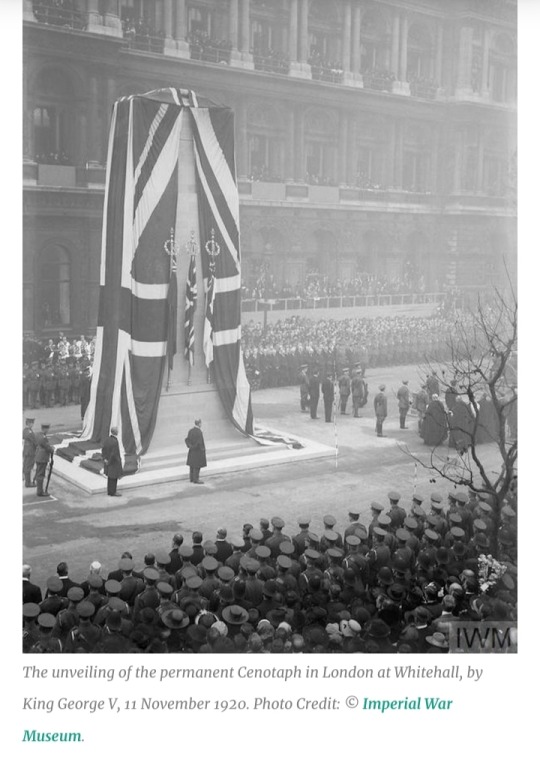



https://www.guidelondon.org.uk/blog/british-military/cenotaph-in-london/
#The Cenotaph#King George V#World War I#PM David Lloyd George#Edwin Lutyens#Versailles Peace Treaty (1919)#Whitehall
11 notes
·
View notes
Text
I recently had a family event and it reminded me why I'm the most insufferable person to talk wwii with. It's literally just
Sb: Asks a basic question about the why's and how's
Me, pulling out dozens of books written by dusty old men: To understand WWII we must first examine the Crimean War...
#and on the topic of the crimean war...#I once did a project on the Treaty of Versailles and when I told my teacher I planned on starting my research with the build up to WWI#he told me that he would give me one hint and it was “Crimean War”#thus began the most hair pulling weeks of my 12 year old life#as I discovered the Crimean War was on its own#a nothing war#done by European countries who were very much not prepared for war#but it was a good starting point in researching the aggression and territorial disputes#at least for a middle school project
5 notes
·
View notes
Text
genuinely why am i a history major i hate . sources
#this is like a half lie. i like finding sources when i get to find them myself. when i must find them in the course content i want to#rip all of my hair out and scream#LIKE I KNOW THIS!!!!! I KNOW THINGS ABT THE WEIMAR REPUBLIC!!!!!!! I KNOW WHY THINGS HAPPENED !!!!!!!!!! U TAIGHT THE CLASS TRUST ME!!!!#hrrgrhfgrhrh . every day i am haunted by the treaty of versailles#iri.txt
2 notes
·
View notes
Text
Paris peace treaties
Wilson's 14 points:
1. abolition of secret diplomacy
2. free navigation at sea for all nations in war and peace
3. removal of economic barriers between states
4. all-round reduction in armaments
5. impartial adjustment of colonial claims in the interests of the populations concerned
6. evacuation of Russian territory
7. restoration of Belgium
8. liberation of France and restoration of Alsace and Lorraine
9. readjustment of Italian frontiers along the lines of nationality
10. self-government for the people of Austria-Hungary
11. Romania, Serbia, and Montenegro to be evacuated and Serbia given access to the sea
12. self-government for the non-Turkish peoples of the Turkish Empire and permanent opening of the Dardanelles.
13. an independent Poland with secure access to the sea
14. a general association of nations to preserve peace
The aims:
FRANCE - Clemenceau
Wanted a HARSH peace that would ruin Germany both economically and militarily so that it could never again threaten French borders.
BRITAIN - Lloyd George
In favour of a less severe settlement that would enable a quick German recovery so that trade could resume. However, Lloyd George had just won an election with slogans such as 'Hang the Kaiser', so the British public expected a harsher settlement.
THE USA - Woodrow Wilson (Jesus-complexed)
In favour of a lenient peace, though he was very disappointed that the Germans had ignored the 14 points when imposing the Treaty of Bretsk-Litovck. He had to accept British and French demands for reparations and German disarmament, but was able to limit the reparations to losses to civilians and their property, instead of 'the whole cost of the war'. He was also in favor of self-determination wherein a nation should be freed from foreign rule and given democratic governments of their own choice.

The treaties:
VERSAILLES - Germany
Fixed the war guilt solely on Germany and its allies (see short-term causes of wwi)
- 10% of its land was removed and redistributed including:
Alsace-Lorraine to France
West Prussia, Posen and Silesia to Poland
Eupen, Malmedy and Moresnet to Belgium
Northern Schleswig to Denmark
Hultschin to Czechoslovakia
Danzig and the Saarland became mandates of the League of Nations
All colonies were lost.
Reparations were set at 132 billion gold marks/£6,600 million.
The army was reduced to 100,000 men
No air force, no tanks, no artillery
12 torpedo boats and no submarines
Rhineland became a demilitarised zone (to increase the security of France, Belgium, and the Netherlands against future German aggression.
Forbidden to unite with Austria

THE GERMAN RESPONSEThey objected on the grounds that they were not allowed into the discussions at Versailles as they were instead presented with the terms and told to sign. Not signing would continue the war. Complaints were heard and promptly ignored.
Perspective: Germans were justified in objecting and it would have been reasonable to let them join the discussion, and would have deprived the argument used by Hitler that the treaty was a 'diktat' and therefore should not be morally binding.
Counterperspective: Germans shouldn't have expected any better treatment after the harsh way they treated the Russians in the Treaty of Bretsk-Litovsk.
The Germans complained that they had been promised terms based on Wilson's 14 points and that many of the provisions were not based on them at all - a swindle. Not very valid as the 14 points had never been accepted as official by any of the states involved.
Germany had ignored them when they still had a chance of victory in January 1918 and since then, Allied attitude towards Germany had hardened (Bretsk-Litovsk, the destruction of mines, factories and public buildings during their retreat through France and Belgium) and led to the addition of two points: Germany should pay for the damage to civilian populations and property, and should be disarmed - all of which they were aware when accepting the armistice. Most terms actually complied....
Germany also complained about the loss of territory in Europe, specifically Upper Silesia, which they ultimately were allowed to keep 2/3 of. They also complained about their colonies that were made into mandates under Britain and France - annexing without admitting they were annexing...
The Germans complained that 100,000 troops were insufficient to keep law and order at a time of civil unrest. As none of the other powers intended to disarm later (despite 'all-round reduction of armaments' being specified in the 14 points), the Germans became further aggrieved.
The Germans objected to being saddled with the entire blame for the outbreak of war. Reached the conclusion in 6 weeks. The Allies wanted the Germans to admit responsibility so that they would be liable to pay reparations.

The final humiliation: the reparations. Many historians now agree that the amount was too high at £6,600 million/132 billion gold marks.
John Meynard Keynes (present as economic adviser to the British delegation) urged the Allies to take £2,000 million, a more reasonable amount that Germany would be able to afford.
The Germans protested that it was impossible to pay, and soon began to default on their annual instalments, causing resentment among the Allies who relied on German cash to help pay their war debts to the USA. Eventually, the Allies realised their mistake and reduced the amount to £2,000 million in The Young plan in 1929, but at this point the reparations had disastrous consequences economically and politically. BUT it could have been worse if Clemenseau had had his way and made the Rhineland an independent state and annexing the Saar.
No one in Germany was happy about the terms but the Allies threatened the Germans with military invasion to get them to sign the treaty. After four years of war and sacrifive, German citizens felt humiliated to accept blame for the war and territorial loss.
Gerhard Weinberg: The 'justice' of the Treaty of Versailles as a source of European discord is irrelevant. The vast majority of Germans in the interwar period believed that their country had actually won wwi, decisively defeating the USA, but that the Reich was defeated by the 'stab-in-the-back' that was the November revolution of 1918 at the moment of victory. Favourable terms would still be challenged. The harshness of the terms have been exaggerated as Germany lost even more to Poland after wwii: Oder-Neisse... (I feel like maybe the partition of Germany had something to do with that though....)
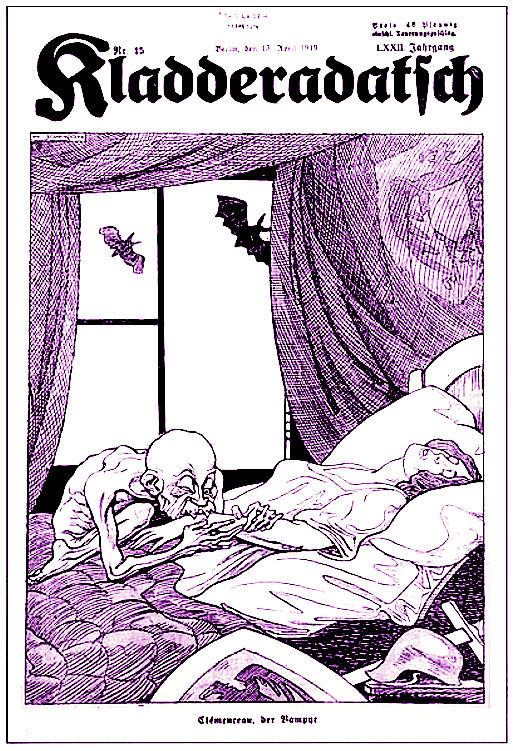
ST. GERMAIN - Austria
Lost land including:
Bohemia and Moravia to Czechoslovakia
Bosnia-Herzegovina and Croatia to Yugoslavia
Bukovina to Romania
Galicia to Poland
The Tyrol, Trieste, Istria to Italy (As promised in the Treaty of London)
Before a reparations figure was set, Austria went bankrupt...
Army reduced to 30,000 men
No air force
No navy
THE AUSTRIAN RESPONSE
Austrian officials protested the violation of the principle of self-determination, the placement of so many ethnic Germans under Czechoslovak and Italian rule, and the forbiddance of unity with Germany.
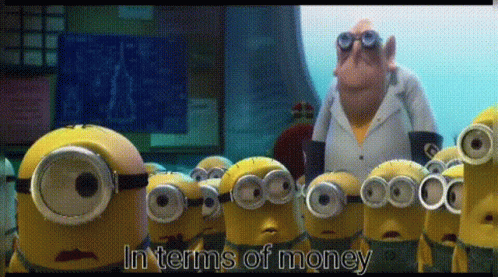
TRIANON - Hungary
Lost over two-thirds of its territory and 64% of its pre-war population including:
Transylvania to Romania
Slovakia, Ruthenia to Czechoslovakia
Slovenia and Croatia to Yugoslavia
Reparations set at 200 million gold crowns (payment suspended due to Hungary's financial difficulties)
Army reduced to 35,000 men
No air force, no tanks, no submarines.
THE HUNGARIAN RESPONSE
Hungarian officials(, like the Austrians,) opposed the displacement of so many ethnic Magyars, especially without plebiscites, in violation of the principle of self-determination. They also opposed the Treaty's violation of Hungary's historical character.
NEUILLY - Bulgaria
Various lands lost to Greece, Romania and Yugoslavia (thereby losing access to the Mediterranean sea)
Reparations set at £100 million (75% of which were later remitted)
Army reduced to 20,000 men
No air force
Navy reduced to four torpedo boats, six motor boats and no submarines
THE BULGARIAN RESPONSE
The Bulgarian people were outraged when they learned of the terms of the Treaty but were not in a position to do anything about it. When wwii broke out, Bulgaria sided with Nazi Germany and reclaimed all the lost land - bitterness it seems.
SEVRES - breaks up the Ottoman empire - Turkey
Lost land including:
South-western Anatolia to Italy
Western Anatolia to create Kurdish and Armenian states
Smyrna and Eatern Thrace to Greece
Middle Eastern possessions became mandates under the control of Britain and France.
Reparations=none
Army reduced to 50,000 men
No air force, tanks or submarines
THE TURKISH RESPONSE
Ataturk (father of Turks) rejected the treaty and forced the Europeans back to the negotiating table and was thus able to secure more favourable terms in The Treaty of Lausanne
LAUSANNE - Turkey
Recognised the Republic of Turkey as the successor state of the Ottoman Empire. The Allies dropped their demands of autonomy for Turkish Kurdistand and Turkish cession of territory to Armenia, abandoned cliams to spheres of influence in Turkey, and imposed no controls over Turkey's finances or armed forces. The Turkish straits between the Aegean Sea and the Black Sea were declared open to all shipping.
2 notes
·
View notes
Text
What if World War I had never happened?
If World War I had never happened, the world would have been very different from what we know today. Here are some possible scenarios of what could have happened:
The collapse of empires may have been delayed: World War I was a major factor in the collapse of empires such as the Austro-Hungarian, Ottoman, and Russian empires. Without the war, it's possible that these empires would have survived longer.
The League of Nations may not have been created: The League of Nations was created in the aftermath of World War I as a means of preventing future wars. Without the war, it's possible that the League would never have been established.
The Russian Revolution may not have happened: World War I was a contributing factor to the Russian Revolution, as the war had placed enormous strains on the Russian economy and military. Without the war, it's possible that the Russian Revolution would not have occurred.
The Treaty of Versailles may not have been signed: The Treaty of Versailles, which imposed heavy reparations on Germany and helped lay the groundwork for World War II, was a direct result of World War I. Without the war, it's possible that the treaty would never have been signed.
National borders may have been different: The redrawing of national borders in Europe after World War I had a profound impact on the continent's political and economic development. Without the war, it's possible that national borders would have remained largely unchanged.
Overall, it's impossible to predict exactly what would have happened if World War I had never occurred. However, the war had a profound impact on the world, shaping the geopolitical landscape and altering the course of history.
#Weimar Republic#germany#ww1 history#what if#british history#europe#Treaty of Versailles#Versailles#british empire#Second World War#First World War#questions#today on tumblr#history#british#deep thoughts#freedom
5 notes
·
View notes
Text
they¹ are in awe of me²
my genocide studies classmates
because i know about hitler's rise to power
#i think you should've taken 20th century world history with me last semester. that teacher explained the treaty of versailles better anyway#anyway please do NOT copy my assignment god bless!!!!!!!!
2 notes
·
View notes
Note
how was your history test
mine was. well i guess it could’ve been worse
LOL! (<- me too ..)
#no so listen. we are given 3 extracts from like random texts. and one political cartoon. (source I was the cartoon. source J was a letter f#rom the time/event. source K and L are like. much later written sources about the event#our event was the treaty of versailles so all the texts and cartoon were abt that right. in the actual ib exam (not this may but the next)#we would have 1h to answer 4 questions#1a: what does source J say about german [bdfkjhfkfhg]. (3 marks)#1b. what does source I say about {sdkfjhdfkds} (2 marks)#so u gotta make 3 points for 1a and 2 for 1b. easy pz. QUESTION 2.#''Considering the Origin. Purpose. and content. determine the values and limitations for a historian studying the treaty of versailles.'#(4 marks). but he wants one paragraph for values and 1 for limitations so 2 paragraphs#btw ques 2 is in relation to source J.#anyways Q3! Make a compare and contrast paragraph about Sources K and L#so another 2 paragraphs <3! woth 6 marks so basically 3 points each paragraphhhh#Q4!!! MAKE A MINI-ESSAY DEPICTING...#idk what the actual q was because we didnt do that lol bc it was a practice paper but still worth for marks yk#ANYWAYS we were given the extracts the weekend b4 so we could technically write the whole thing at home but then that wouldnt help at all#with the actual IB exam next may#so i just did background info and made starter sentences right#i wasnt even panicked like i admitted defeat ngl#hashtag over it.#OH BTW ON THE ACTUAL MAY EXAM. YOURE NOT GIVEN THE EXTRCTS BEFOREHAND so u go in with pen and paper and u rlly rawdog it#THIS IS PAPER 1 BTW. there's 3....#previous years got only 1 and 2 bc of covid but today we gotta do every single paper im so mad#theres three papers for each subject. i have 6 papers.#subjects**
3 notes
·
View notes
Text
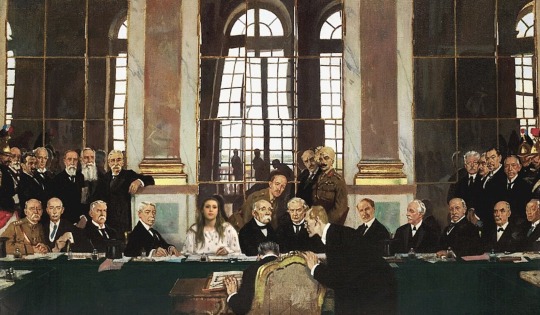
Olivias treaty of versailles
6 notes
·
View notes
Photo

^ Food Lines in Hanover, Germany, 1918 (Photo: Hanover Press Photographer)
After WWI, the Treaty of Versailles demanded that Germany pay 132 billion gold marks, which would equal $269 billion in 2019 dollars. This led to an economic collapse, which eventually contributed to the rise of the Nazis.
Read more history at rayeshistory.com
9 notes
·
View notes
Photo
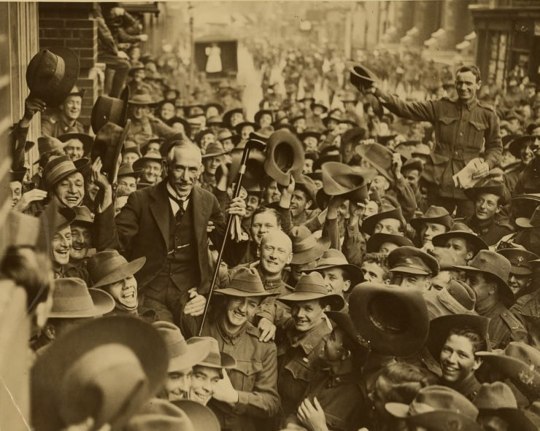
Des soldats australiens portent en triomphe le Premier Ministre australien William Morris 'Billy' Hughes le long de George Street après son retour de la Conférence de la Paix de Paris (Traité de Versailles) – Sydney – Australie – 1919
©National Library of Australia - NLA an23150756
#WWI#Avant-guerre#Pre-war#Conférence de la paix de Paris#Paris Peace Conference#Traité de Versailles#Treaty of Versailles#Premier Ministre Australien#Prime Minister of Australia#William Morris 'Billy' Hughes#Billy Hughes#Sydney#Australie#Australia#1919
3 notes
·
View notes
